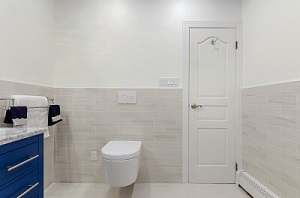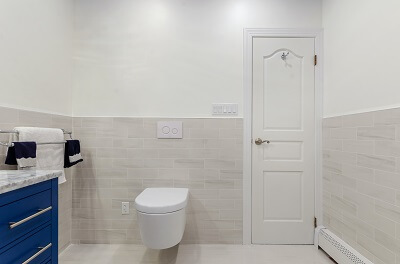When someone knocks on the bathroom door, you may think of responding in a variety of ways. Your response may vary slightly depending on whether you are at home, work, or in a more public situation.

It is important to give the person on the other side an appropriate response so they know the bathroom is occupied. You can do this by shouting out a quick “Occupied” or a double knock on the door if you don’t want to communicate.
Respond Immediately
When someone knocks on the bathroom stall, they likely want to use it too. They may be in a hurry and responding quickly will allow them to move on to find another bathroom. Sometimes seconds matter, so don’t delay in giving a response.
This is especially true if you are in a more public context, where a mix of elderly people, pregnant women, and people with different medical conditions can increase urinary urgency, maybe rushing to the bathroom. Studies show that the sudden, compelling desire to pass urine can be difficult to defer in elderly people at times.
Answer promptly so other people can make decisions more quickly.
Quick Verbal Responses
Short verbal responses that quickly get to the point are sometimes best. You could say one of the following:
“Occupied”
“Full”
“Somebody”
“Someone’s here.”
A quick verbal response allows you to concentrate on using the bathroom, instead of getting caught up in whatever the other person wants to say.
Ensure that your tone is polite because sometimes people get offended if you sound like you’re chasing them away. They may even forget about their urgent need to use the bathroom as they get caught up in a belligerent rant. Keep it short and sweet.
Long Verbal Responses
Long verbal responses give the person enough time to register that someone is speaking to them and then process what that person is saying. Also, some people may just simply not be one-word communicators.
If you like to use longer sentences when you’re talking, consider responding with one of the following in moderate or high volume:
“The bathroom is occupied right now.”
“The bathroom is in use.”
“Someone is in the bathroom.”
“I am in the bathroom.”
When you’re responding to someone who is outside the bathroom stall, speak loudly enough so that the sound can penetrate the bathroom walls. Some bathrooms in private residences have been soundproofed, so normal conversation will not escape them clearly or may be muffled.
If you’re in a bathroom that has bottom door sweeps, rubber mats, and a few hampers, these will all help to absorb noise. That may make it hard for the other person to hear what you are saying. Ensure that you speak loudly enough for someone else to hear you clearly on the other side of a thick door.
Nonverbal Responses
Sometimes you may be in the bathroom and you don’t want anyone to know you’re in there. For example, you may be at work and you may not want to be the topic of gossip, so you want to avoid answering. If you don’t want the person on the other side of the door to use your voice to identify you, a nonverbal response may be a good idea.
Simply knock on the door from your side. A quick double knock will let the person know that someone is in the bathroom. If they are confused and knock on the door again, simply knock again in response. Don’t speak. They will figure it out.
Nonverbal responses are also helpful if you have a disability that makes it difficult to speak or another condition that can slur your words. It also helps in situations where you may be feeling nauseous or you are crying and don’t want to communicate verbally. You could even stick a sheet of paper over the door with the word, “Occupied” written on it.
Repeated Knocking
Some people just won’t get the hint. They insist on using the bathroom that you’re in, even when other alternatives are available.
Sometimes there may be feminine care facilities that are only available in the stall that you’re in, so take a quick look around the bathroom to see if there’s anything unique about it. You may have also entered a bathroom that is equipped with a changing table or is built for people who use mobility devices.
In a case where your bathroom may be the only one that another individual can use, you could try one of these responses:
“I will be out soon.”
“I’ll be out in five minutes.”
“I’m having a medical emergency and may be here for the next ten minutes.”
Sometimes people just want to knock and keep knocking because they don’t want to walk to another bathroom. You might wonder what their problem is. In that case, you could say:
“Please try another bathroom.”
“I will not be finished anytime soon.”
“Go to another bathroom.”
You’ve Been there For a While
Sometimes a person may knock on the bathroom door because you’ve been there for longer than you usually would be. This is more likely to happen when you’re at home or work.
If a colleague has noticed that you’ve been upset all morning and then you suddenly disappear to the bathroom for thirty minutes, they may come and check on you.
In this case, they may say your name. You may also notice from their tone that they have a concern. They may say:
“Kyle, are you okay?”
“Eric, are you in there?”
While they may be concerned, you are not obligated to share your feelings with them if you don’t want to. If you don’t want to get into a long discussion about why you’re in the bathroom, you could simply answer:
“Janet, I’m here. Did you need something?”
“I’m here Janet. I’ll be with you shortly.”
“I’m okay Janet.”
It is normal for human beings to be concerned about others. However, people also have the right to have their boundaries respected. You may be in the bathroom because you have a health issue that you don’t want to discuss with anyone else at work. This is your choice and you have a right to be respected.
While medical professionals are bound by confidentiality clauses in their contracts, there’s nothing like that to prevent your coworkers from chatting about your health concerns behind your back. The less information they have about you the better it is for you.
You never know when someone may use a medical condition as an excuse to block your career progression, even when it does not have an impact on your work performance. Besides that, it’s just poor form for people to talk about the personal business of others behind their backs.
Pay Attention to Unvoiced Concerns
Sometimes when a person knocks on the bathroom stall when you’re at home, they may be of an age where they cannot vocalize what they need.
For example, if you’re home with your toddler and you just pop into the bathroom, they may knock. When you ask them what’s the matter, all they may say is “Dada?”
You could say:
“Are you okay Jane?”
“Jane, where is Rover?”
“Did you finish your juice?”
Ask questions related to the last thing that you saw the child doing or whatever they were supposed to do during your bathroom break. Pay attention to their body language. They may not always be able to tell you that they spilled their juice or that the puppy got out of their play area.
In that case, you’ll just have to hurry up and go check on them. Listen to their tone of voice. If they don’t sound agitated and are merely curious, don’t allow your stress level to rise unnecessarily.
Some parents keep the bathroom door slightly open when they have young children. It allows them to keep their ears attuned to what is happening in the rest of their house. At every stage, you can teach the child age-appropriate tips on bathroom privacy.
Stay Professional
Once you’re in a work environment, it’s important to always be professional in your response. Say:
“This stall is occupied.”
Someone who needs information urgently may come to the bathroom to get it from you or try to corner you in the bathroom so they can pressure you with a request. If you don’t feel comfortable talking then, say:
“Let me talk to you about that in five minutes”
“I’ll meet you outside in four minutes to talk about that.”
“Give me a few minutes (or hours) to think about it and get back to you.”
Make the Main Thing the Main Thing
When someone knocks on the bathroom door, it’s easy to get distracted, particularly if you feel like they are just being annoying. It’s easy to feel like that if you’re a teenager in a house with other teens who really may not be able to resist knocking on the door for fun at certain times.
Don’t get distracted or let noise on the outside prevent you from feeling relaxed as you brush your teeth or do whatever else you may be doing. Make the main thing the main thing and stay focused on whatever you’re doing.

Katie Holmes is a senior author at everyday-courtesy.com with over 15 years of experience in marketing and psychology. As a freelance consultant, she also supports companies and executives in overcoming communication challenges. Katie is a passionate digital nomad working on her first book on the art of communication.

